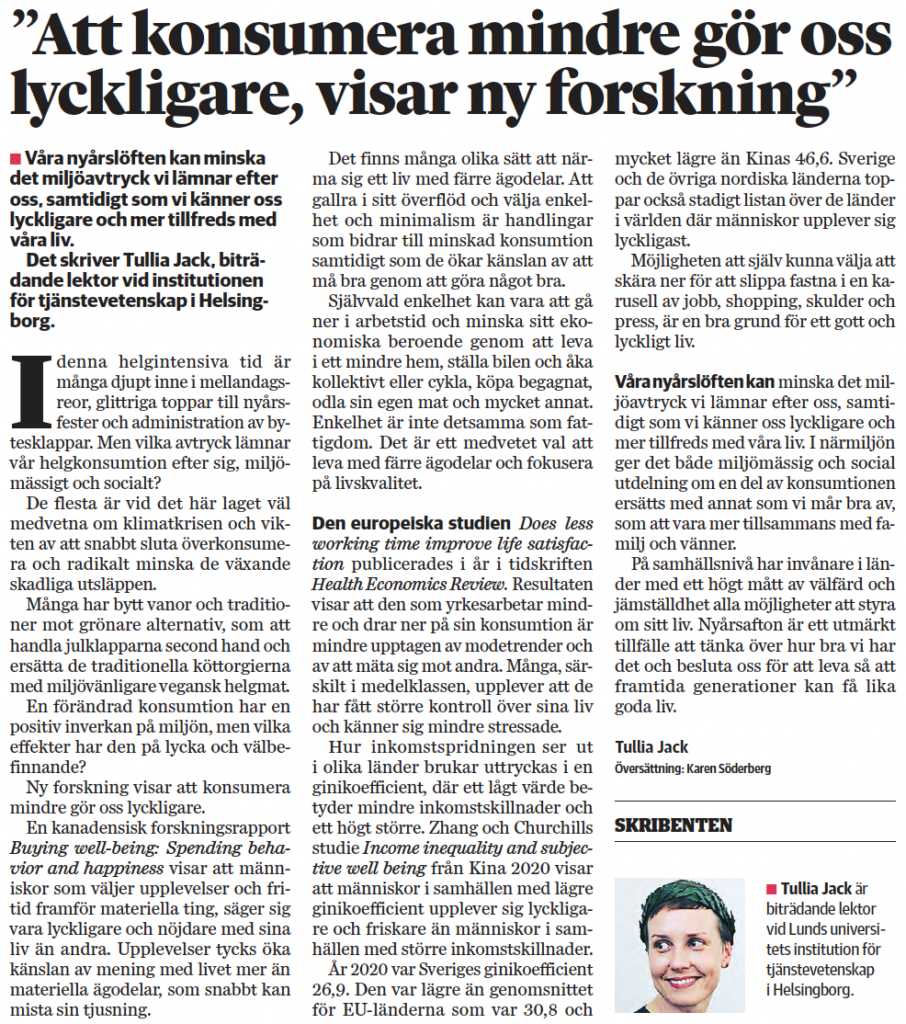
In this holiday-intensive season, many are deep into boxing day sales, glittery tops for New Year’s parties and exchanging unwanted christmas gifts. But what footprint does our holiday consumption leave behind, environmentally and socially?
By now, most people are well aware of the climate crisis and the importance of stopping over-consumption and radically reducing C02 emissions.
Many have switched habits and traditions to greener alternatives, such as buying Christmas presents second hand and replacing traditional meat orgies with more environmentally friendly vegan holiday food. Changing consumption has a positive impact on the environment, but what are its effects on happiness and well-being?
New research shows that consuming less also makes us happier.
A Canadian research report Buying well-being: Spending behaviour and happiness shows that people who choose experiences and leisure over material things say they are happier and more satisfied with their lives than others. Experiences seem to increase the sense of meaning in life more than material possessions, which can quickly lose their allure.
There are many different ways to approach a life with fewer possessions. Thinning out excesses and choosing simplicity and minimalism are actions that contribute to reducing consumption while increasing the sense of well-being.
Voluntary simplicity can include cutting down on working hours and reducing financial dependency by living in a smaller home, ditching the car and taking public transport or cycling, buying second-hand, growing your own food and much more. Simplicity is not the same as poverty. It is a conscious choice to live with fewer possessions and focus on quality of life.
The European study Does less working time improve life satisfaction was published this year in the journal Health Economics Review. The results show that people who work less and cut back on consumption are less preoccupied with fashion trends and measuring themselves against others. Many people, particularly those in the middle class, feel they have more control over their lives and are less stressed.
The distribution of income across countries is usually expressed in terms of a Gini coefficient, where a low value means less income inequality and a high value means more. Zhang and Churchill’s study Income inequality and subjective well being from China, 2020 shows that people in societies with lower Gini coefficients feel happier than people in societies with greater income inequality.
In 2020, Sweden’s gini coefficient was 26.9, lower than the EU average of 30.8 and much lower than China’s 46.6. Sweden and the other Nordic countries also consistently top the list of countries in the world where people feel happiest.
The ability to choose to cut back to avoid getting stuck in a merry-go-round of jobs, shopping, debt and pressure is a good foundation for a good and happy life.
Our New Year’s resolutions can reduce the environmental footprint we leave behind, while making us feel happier and more satisfied with our lives. In the local community, replacing some of our consumption with spending more time with family and friends, has both environmental and social dividends.
At the societal level, people in countries with high levels of well-being and equality have every opportunity to redesign their lives. New Year’s Eve is an excellent opportunity to reflect on how well we are doing and decide to live so that future generations can enjoy similarly good lives.
